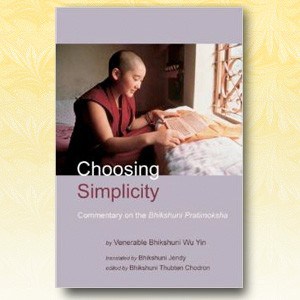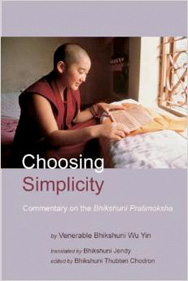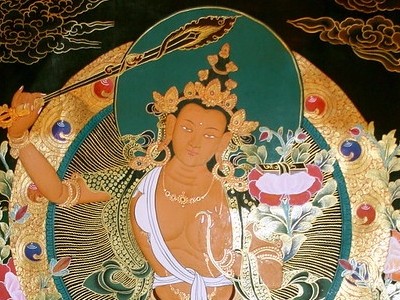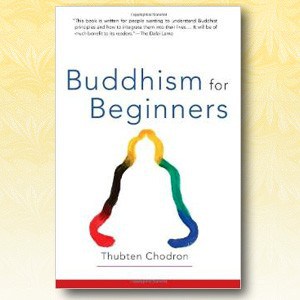Monastic life: a living tradition
The story behind Choosing Simplicity

Behind each page of a book lies a story. This story is not necessarily expressed in the content of the book; rather, it is the story of the lives of the people involved in writing and producing it. In the case of Choosing Simplicity, the story encompasses the lives of many people and the way those lives intersected at certain times in history.
Growing up in middle class America, I became a teenager in the ’60s. Far from the peaceful patience that one associates with Buddhism, I was hardly what one would consider a likely candidate for monastic ordination. Yet, when I encountered the Buddha’s teachings in 1975, at age twenty-four, they spoke to my heart in a powerful way, and two years later I became a nun in the Tibetan tradition.
In 1989, I was on a teaching tour in the USA, and during a stop in Seattle, my host took me to the American Evergreen Buddhist Association. There I met Bhikshuni Jendy, a Chinese nun from Taiwan. A friendship developed quickly and deepened in 1992 when I settled in Seattle as the resident teacher at Dharma Friendship Foundation. She was a student of Venerable Master Wu Yin, a remarkable teacher in Taiwan who had begun her own monastery, educational institute, and Buddhist press. Venerable Master Wu Yin had over one hundred bhikshuni disciples, who were renowned for being amongst the best educated in Taiwan.
After a conference in 1993, during which Bhikshuni Tenzin Palmo’s presentation on the plight of Western monastics in the Tibetan tradition caused His Holiness the Dalai Lama to weep, a few of us Western nuns had the idea of organizing an educational program for Western nuns. We named this Life as a Western Buddhist Nun and planned it for February 1996, in Bodhgaya, India, the site of the Buddha’s enlightenment.
Since the full ordination (bhikshuni) for women had not spread in Tibet, we turned to our Chinese sisters for guidance. Bhikshuni Jendy suggested we invite Venerable Master Wu Yin to teach us, and in 1995 I went to her temple in Taiwan to extend the invitation personally. Venerable Master Wu Yin had never taught Westerners before, and day after day I pleaded with her to endure the discomforts of life in India in order to spread the Dharma to a group of independent-minded, non-conformist Western nuns.
On February, 4, 1996, the day of the opening ceremony for Life as a Western Buddhist Nun, the Stupa marking the site of the Buddha’s enlightenment at Bodhgaya, India shone in the setting sun. Gathered near the gate were nuns, monks, laypeople, teachers, participants, and staff. Drawing nearly one hundred participants from all over the world, Life as a Western Buddhist Nun was a grassroots endeavor whose principal aim was to help the first generation of Western nuns practicing in the Tibetan Buddhist tradition learn the Vinaya, the monastic discipline.
With teachers and students walking in procession, we circumambulated the Enlightenment Stupa, the marble of its inner walkway feeling cool under our feet. Then we sat under the bodhi tree with its sprawling branches and offered prayers for the program to be successful and for its benefits to ripple forth and bring happiness to all beings. We entered the small sanctuary inside the stupa. In the presence of the Buddha statue and with nuns, monks, and lay practitioners, Venerable Master Wu Yin said:
Over twenty-five hundred years ago, the Buddha’s stepmother, Mahaprajapati and five hundred women from the Shakya clan went through incredible difficulties to request bhikshuni ordination from the Buddha. In giving them permission to enter the order, the Buddha affirmed women’s ability to practice the Dharma, to liberate themselves from cyclic existence, and to become enlightened. For over twenty-five centuries, women have practiced the Dharma and achieved the beneficial results. Now we are reaping the benefit of their practice and of the Dharma that they preserved and passed down. It is our privilege and responsibility to learn and practice the Dharma not only to attain spiritual realizations, but also to benefit others by preserving and passing on these precious teachings to future generations.
Nearly every day for the next three weeks, Venerable Master Wu Yin taught us the bhikshuni pratimoksa, the precepts of the fully ordained nuns. She made us think deeply, as well as laugh, and cry, as she taught us, quizzed us, prayed with us, answered our questions, and even had us compose skits about our experiences as nuns. With Bhikshuni Jendy as her translator, the teachings came to us crystal clear and had a deep impact on our lives.
Wishing to make these teachings available to others, I transcribed her tapes, edited the material and bombarded Bhikshuni Jendy with innumerable points to clarify and new questions to answer. Choosing Simplicity is the result of this process, and it is our hope that many will benefit from reading it.
Due to increased interest in Buddhism and the prominence of remarkable monastics, such as the Nobel Peace Prize winner, His Holiness the Dalai Lama, many people are curious about the Buddhist monastic lifestyle. They see Buddhist monastics—from His Holiness the Dalai Lama and Thich Nhat Hanh to a newly ordained monk or nun—walking on the streets in every major Western city, in airports, and on television, and wonder, “What is their life like? What makes these people tick?”
People realize that knowledge of others’ traditions enriches their own spiritual practice. For example, many Catholic monks and nuns have expressed interest in learning about the precepts and lifestyle of Buddhist monastics. This book provides a tremendous opportunity for such interreligious dialogue.
Further, whether or not we are Buddhist monastics, knowing the precepts can make us more mindful of our behavior. For example, monastics have a precept not to watch entertainment with the motivation of attachment or distraction. Even if we do not have this precept, it is nonetheless valuable to become more aware of the role entertainment plays in our life. Do we turn the radio on every time we get into the car? Do we spend hours channel surfing on the TV? What is a healthy way to relate to entertainment, and how do we differentiate entertainment from gaining relevant and necessary information on current events? Such questions are important for everyone to contemplate, and learning the precepts sparks introspection and discussion on such matters.
Moreover, although university scholars have examined the Vinaya, the monastic discipline, little has been written about it with vocabulary and style suitable for the general public. Choosing Simplicity is readable and informative for all. Full of stories describing the activities of the Buddha’s disciples that led to his establishing the precepts, it makes evident that although the social environment has changed since the Buddha’s time, basic human nature has not. Our own foibles and bad habits come to life in these stories, and we come to understand the necessity of ethical discipline for a harmonious society and a happy mind.
This book presents monastic life as a living tradition. It shows how to live ethically in daily life in a modern society, for the Buddha’s teachings do not exist in static, dry form in books. The evolution and application of the precepts to people’s lives in each generation is a living process. Further, as lay practitioners learn more about monastic lifestyle through this book, their faith in sincere monastic practitioners will increase, for they will see that monastics can help and inspire them along the path.
Through reading this book, people considering taking ordination will gain a better understanding of monastic life and will therefore be able to make well-informed and thoughtful decisions about ordination. Those who are novices will learn the full precepts and be able to train in them before actually receiving them, while those who are fully ordained will understand what to practice and what to abandon on the path, thus enabling them to keep their precepts purely and progress on the path.
On the Lunar New Year, Venerable Master Wu Yin told us,
Early this morning I went to the Enlightenment Stupa and prayed for peace to fill our world and for Dharma to be sustained. I prayed that the Buddha’s wisdom and light go with each of you, so that you will bring the Buddhadharma to every corner of the world you visit, sharing it skillfully according to the dispositions of the people and culture of the place. Each of you preserves the Dharma within yourself, and by practicing the Buddha’s teachings and observing the Vinaya, you will tame your actions of body, speech, and mind. For that reason, take care of yourselves, not out of selfishness, but in order to cultivate your wisdom, accumulate positive potential, and benefit all beings.
I am sure she extends these same aspirations to all those who read her book.
Venerable Thubten Chodron
Venerable Chodron emphasizes the practical application of Buddha’s teachings in our daily lives and is especially skilled at explaining them in ways easily understood and practiced by Westerners. She is well known for her warm, humorous, and lucid teachings. She was ordained as a Buddhist nun in 1977 by Kyabje Ling Rinpoche in Dharamsala, India, and in 1986 she received bhikshuni (full) ordination in Taiwan. Read her full bio.



